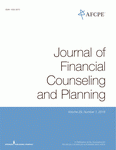
Journal of Financial Counseling and Planning
Scope & Guideline
Transforming Financial Literacy into Actionable Insights.
Introduction
Aims and Scopes
- Financial Literacy and Education:
The journal focuses on the development, assessment, and impact of financial literacy programs, exploring how educational interventions can improve financial knowledge and behaviors among various demographic groups. - Consumer Financial Behavior:
Analyzing factors that influence consumer financial behaviors, including spending, saving, debt management, and investment decisions, with a particular emphasis on the role of psychological and social factors. - Financial Counseling and Coaching:
Research on the effectiveness of financial counseling and coaching practices, including methodologies for enhancing financial capabilities and addressing financial stress among clients. - Impact of Economic Conditions:
Examining how economic events, such as the COVID-19 pandemic, influence financial well-being, mental health, and financial decision-making among different populations. - Diversity and Inclusion in Financial Services:
Investigating the experiences and needs of underrepresented groups in financial contexts, including racial/ethnic minorities, women, and low-income households.
Trending and Emerging
- Financial Stress and Mental Health:
There is a marked increase in research exploring the interplay between financial stress and mental health, particularly in light of the COVID-19 pandemic, highlighting the need for integrated approaches to financial counseling. - Technology and Financial Behavior:
Emerging research focuses on the role of technology in shaping financial behaviors, including the use of mobile financial services and fintech solutions, reflecting a growing interest in how digital tools can enhance financial capability. - Coping Mechanisms in Financial Decision-Making:
The exploration of coping strategies and personality traits in relation to financial stress and decision-making is gaining traction, indicating a shift towards understanding individual psychological factors influencing financial outcomes. - Diversity in Financial Planning:
An increasing focus on the experiences and financial behaviors of diverse populations, including marginalized communities, is evident, emphasizing the importance of culturally relevant financial counseling practices. - Intersections of Financial Behavior and Life Satisfaction:
Research is trending towards understanding the links between financial behaviors and overall life satisfaction, particularly in relation to student loans and emerging adulthood, recognizing the holistic impact of financial well-being.
Declining or Waning
- Traditional Retirement Planning:
Research related to traditional retirement planning strategies has diminished, possibly due to the increasing complexity of retirement income sources and the shift towards more personalized financial planning approaches. - General Financial Knowledge Assessments:
While financial literacy remains a focus, there has been a decline in studies solely focused on broad assessments of financial knowledge without contextual application, as researchers shift towards practical implications and behavioral outcomes. - Static Models of Financial Behavior:
The use of static models to analyze financial behaviors is decreasing, with a growing preference for dynamic and longitudinal studies that capture changes over time and the impact of external factors.
Similar Journals
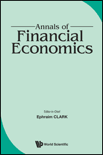
Annals of Financial Economics
Illuminating Contemporary Issues in Financial EconomicsAnnals of Financial Economics, published by World Scientific Publishing Co. Pte Ltd, is a premier scholarly journal catering to the fields of finance, economics, and international management. With an impressive impact factor and categorized in the Q2 quartile across multiple disciplines in the 2023 rankings, the journal holds a prominent position among its peers, evidenced by its ranking in the top 15% for Economics and Econometrics and Finance categories. The journal aims to foster high-quality, innovative research that addresses contemporary financial issues, making it a vital resource for researchers, professionals, and students alike. Although it does not operate under an open access model, it ensures that its contributions advance scientific discourse and provide valuable insights into financial theories, practices, and policies. With a historical publication span from 2005 to 2009 and again from 2011 to 2024, the Annals remains a critical platform for disseminating transformative ideas in financial economics, ensuring its relevance in a rapidly evolving scholarly landscape.
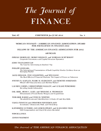
JOURNAL OF FINANCE
Leading the way in financial theory and practice.JOURNAL OF FINANCE, published by Wiley, stands as a premier academic journal in the fields of finance, economics, and accounting. With a history dating back to 1946, the journal has consistently delivered impactful research that shapes financial theory and practice, boasting an impressive impact factor reflective of its high citation rate. Its Quartile 1 ranking in Accounting, Economics and Econometrics, and Finance illustrates its leading position within these disciplines. Although not an open access publication, the journal continues to be indispensable for researchers, professionals, and students seeking to advance their understanding and knowledge through rigorous empirical analysis and comprehensive reviews. With an esteemed global readership, the JOURNAL OF FINANCE remains committed to fostering the dissemination of innovative financial research well into 2024 and beyond.

Asian Academy of Management Journal of Accounting and Finance
Innovating Research for a Dynamic RegionThe Asian Academy of Management Journal of Accounting and Finance, published by PENERBIT UNIVERSITI SAINS MALAYSIA, is a pivotal open-access platform that has been disseminating valuable insights in the field of accounting and finance since its inception in 2006. With an emphasis on the unique economic landscape of Asia, this journal provides a forum for researchers and practitioners to contribute innovative research and critical analyses. Hailing from Malaysia, it boasts an E-ISSN of 2180-4192 and continues to be a significant resource for academics, professionals, and students alike. Regularly updated and accessible since 2012, the journal offers an increasing repository of knowledge, as indicated by its Scopus rankings in both the Finance and Accounting segments, with respective ranks of 197/317 and 121/176. Despite its recent Q4 and Q3 quartile standings for 2023, the journal demonstrates a commitment to elevate research quality and influence within the respective disciplines. For those interested in expanding their understanding of contemporary issues in accounting and finance, the Asian Academy of Management Journal stands as an essential scholarly resource.
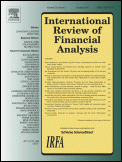
International Review of Financial Analysis
Exploring innovative theories in global financial landscapes.The International Review of Financial Analysis, published by Elsevier Science Inc, is a premier journal dedicated to advancing the fields of finance and economics. With an impressive impact factor and ranked in the top quartile (Q1) of both Economics and Econometrics and Finance categories, this journal is recognized for its high-quality research and significant contributions to the discipline. Since its inception in 1992, it has provided a platform for scholars to present innovative theories and empirical studies that address critical financial issues around the globe, making it a vital resource for researchers, professionals, and students alike. Although it does not offer open access, the journal actively engages with contemporary debates in financial analysis, ultimately empowering its readership to contribute to and benefit from the ongoing discourse. With its convergence of financial research and analytical methodologies through 2024, the International Review of Financial Analysis remains a cornerstone in the pursuit of knowledge within the ever-evolving landscape of finance.
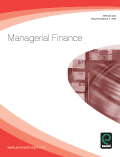
MANAGERIAL FINANCE
Advancing Knowledge in Managerial Decision-Making.MANAGERIAL FINANCE is a prestigious academic journal published by Emerald Group Publishing Ltd, focused on the areas of finance, management, and strategy. With an ISSN of 0307-4358 and an E-ISSN of 1758-7743, this journal has carved a niche for itself within the business and financial sectors, achieving a commendable Q2 category ranking across multiple domains, including Business, Management and Accounting, Finance, and Strategy and Management, as of 2023. The journal aims to provide a platform for insightful research and critical analysis while fostering an understanding of contemporary financial practices and theories. With its wide-ranging scope, it serves as a vital resource for researchers, professionals, and students alike, looking to stay abreast of the latest trends and challenges in managerial finance. The editorial board is committed to maintaining academic rigor, ensuring that articles published are of the highest quality and relevance to the field. By bridging the gap between theory and practice, MANAGERIAL FINANCE is an essential reference for anyone involved in financial decision-making and strategic management.

International Journal of Managerial Finance
Driving rigorous research in managerial finance.The International Journal of Managerial Finance is a leading academic journal published by Emerald Group Publishing Ltd, dedicated to advancing the field of finance through rigorous research and scholarly discourse. Its ISSN is 1743-9132, with an E-ISSN of 1758-6569. Since its inception in 2005, the journal has provided valuable insights and frameworks that bridge theory and practice in managerial finance, making it an essential resource for researchers, professionals, and students alike. With its current standing at Q2 in both Business, Management and Accounting and Finance categories for 2023, and impressive Scopus ranks that place it in the 70th and 68th percentiles respectively, the journal is recognized for its high-quality contributions to the field. Though it does not currently offer open access, the rigorous selection process ensures that published articles are of the highest academic standard, providing a platform for significant discussions around contemporary issues in finance and management. The International Journal of Managerial Finance continues to play a pivotal role in shaping the discourse within the financial sector, fostering knowledge that is instrumental for effective managerial decision-making.
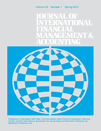
Journal of International Financial Management & Accounting
Delivering Cutting-Edge Research to Shape Financial PracticesThe Journal of International Financial Management & Accounting is a premier academic publication dedicated to advancing the fields of accounting, finance, and business management on an international scale. Published by Wiley, this esteemed journal boasts an impressive track record since its inception in 1989, converging insights from 1992 onwards to deliver cutting-edge research and analysis up to 2024. With an exceptional impact factor, the journal is ranked in the top quartile across multiple categories—Q1 in Accounting, Q1 in Business, Management and Accounting, and Q1 in Finance—as per the latest assessments. Its Scopus rankings further underscore its significance, placing it amongst the top 5% of journals in its respective fields. Although the journal is not open access, it remains an essential resource for researchers, professionals, and students seeking in-depth knowledge and innovative perspectives in international financial management and accounting practices. The journal’s commitment to high-quality research makes it a vital platform for thought leadership in a rapidly evolving global financial landscape.
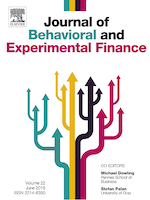
Journal of Behavioral and Experimental Finance
Exploring the Psychology Behind Financial ChoicesJournal of Behavioral and Experimental Finance, published by Elsevier, stands as a premier outlet for groundbreaking research in the realm of finance, particularly focusing on the psychological and behavioral factors that influence financial decision-making. With an ISSN of 2214-6350 and an E-ISSN of 2214-6369, this journal has established itself within the top tier, achieving a Q1 ranking in Finance for 2023, and is currently positioned 10th out of 317 journals in the Scopus category of Economics, Econometrics and Finance, demonstrating a remarkable 97th percentile ranking. Aiming to bridge theoretical advancements with practical applications, the journal encourages submissions that explore innovative methodologies and empirical studies, offering valuable insights for academics, practitioners, and students alike. As a vital resource for those interested in the confluence of psychology and finance, the Journal of Behavioral and Experimental Finance is pivotal in shaping the future of financial research and practice.

JOURNAL OF FINANCIAL SERVICES RESEARCH
Innovating insights for a changing financial landscape.The JOURNAL OF FINANCIAL SERVICES RESEARCH, published by SPRINGER, serves as a critical platform for scholarly discourse in the fields of finance, accounting, and econometrics. With a dedicated focus on innovative research and rigorous analysis, this journal has maintained a respectable Impact Factor, placing it in the Q2 category for 2023 across multiple academic disciplines including Accounting, Economics, and Finance. Since its inception in 1987, it has contributed significantly to the advancement of knowledge and practice within financial services, making it essential reading for researchers, professionals, and students alike. The journal is based in the Netherlands and hosts contributions that address contemporary issues in financial systems, markets, and institutions. Despite its non-open access format, the journal remains highly relevant, with Scopus rankings indicating its solid position within its peer group, especially in the realms of Economics, Econometrics, and Finance. As the journal approaches its converged coverage through 2024, it aims not only to disseminate high-quality research but also to foster a deeper understanding of the dynamic financial landscape.

Finance Research Letters
Advancing financial knowledge through rigorous research.Finance Research Letters, published by Academic Press Inc Elsevier Science, is a leading journal in the field of finance, recognized for its exceptional impact as indicated by its Q1 ranking in the Finance category of the Scopus Index, placing it in the top 6% of journals in this area. With an ISSN of 1544-6123 and an E-ISSN of 1544-6131, this journal has been a crucial platform for disseminating cutting-edge research since its inception in 2004. It covers a wide array of topics within finance, including but not limited to portfolio management, risk assessment, and financial innovation, making it an invaluable resource for researchers, professionals, and students committed to advancing their understanding of the financial sector. Although it does not currently offer open access, its contributions to the field are amplified by its impressive Scopus rank of #19 out of 317 in the Economics, Econometrics and Finance category. As the journal continues through its convergence years until 2024, it remains dedicated to publishing high-quality, peer-reviewed articles that reflect the latest trends and innovations in financial research.